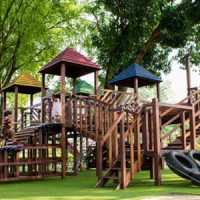What Is An “Attractive Nuisance”?

Owners of buildings and land have obligations with respect to ensuring that their property is safe for those who are invited onto and legally using their land or property, an obligation linked to premises liability when people get hurt while on these premises due to failure to keep them reasonably safe.
However, what many people do not realize is that there is additional responsibility towards minors who are attracted to particular conditions on property – regardless of whether they were invited there or not – and this is known as the “attractive nuisance” doctrine. The doctrine makes both property owners and even tenants, in some circumstances, responsible for creating or allowing dangerous conditions that are attractive to children on their property. Some examples of these conditions might be a pool of chemicals left at an industrial site that is not properly guarded off by fencing, or even just a regular swimming pool, if it has not been left reasonably safe to others who could gain access to it and get hurt by using it.
Georgia Law
While the specifics vary from state to state, in Georgia, an attractive nuisance is defined as connected to “inherently dangerous instrumentalities” which are attractive to children, and this includes swimming pools, trampolines, and more. In fact, this can include any and all features of the property that:
- Create a dangerous condition;
- Likely to attract young minors who are incapable of understanding the danger and risks associated with it;
- Where the landowner has failed to take feasible, reasonable steps to guard against injury risks associated with it (or those feasible, reasonable steps which would have rendered the condition harmless)
Most Common Examples
Some of the most common attractions that can arguably become attractive nuisances include:
- Construction projects
- Vehicles
- Playground equipment
- Swimming pools
- Trampolines
- Treehouses
- Weapons
- Water features (for example, water fountains)
- Ziplines
In Court/Litigation
In these cases, parents will often bring premises liability on behalf of their children who were injured due to nuisance, and in many cases, the property insurance will typically cover all or most of the damages, either due to a court verdict or settlement. Where there are typically disputes involve claims that the landowner took the appropriate steps to guard against children accessing the property, such as fencing and other actions, in accordance with local ordinance requirements.
Let Us Help You Today
If your child has been injured due to an inherently dangerous condition on someone else’s property, contact our Macon premises liability attorneys at the Law Offices of Buzzell, Welsh & Hill today to find out how we can help.
